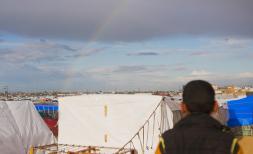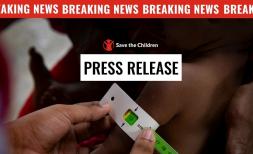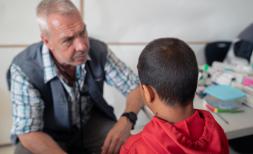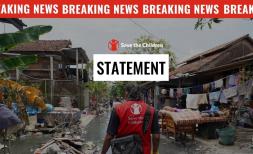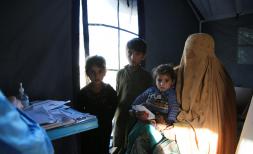Save the Children provides isolation centres for low-income communities facing Covid19 in Lebanon
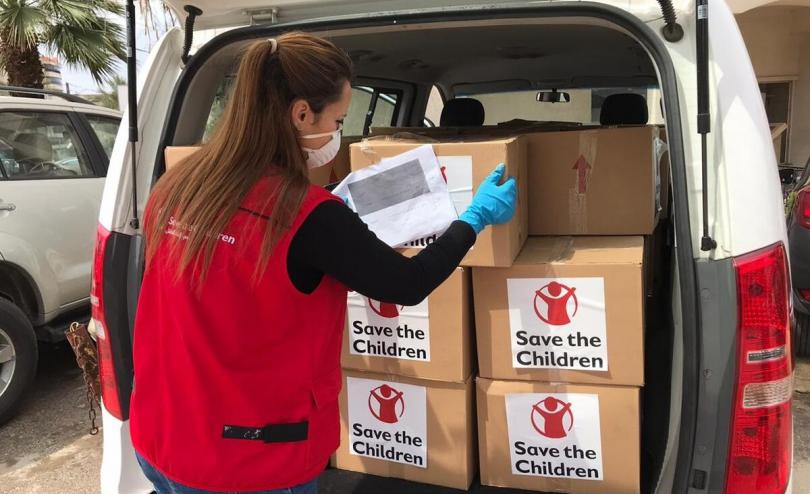
Children at high risk of fallout from compounded economic and health crisis.
You can find multimedia content, including a social video, here.
With COVID-19 cases having been registered among refugee and local communities in Lebanon, Save the Children and its partners are refurbishing a restaurant, a factory and seven other buildings so they can be used as isolation centres. It is also turning empty tents in refugee settlements in the Bekaa valley into isolation units, so that patients can self-isolate within the camps.
Thousands of vulnerable families are set to face the Coronavirus outbreak with little means in a country that is already suffering from a crippling economic crisis.
Save the Children’s teams in the Bekaa valley, bordering Syria, will refurbish the nine abandoned buildings before handing them over to the Ministry of Health, which will turn them into temporary health facilities for up to one thousand COVID-19 patients, Lebanese as well as Syrian and Palestinian refugees.
The agency is also transforming tents into isolation units in 218 informal settlements, that are home to 45,500 refugees, and will provide local communities with information on how to manage an outbreak including on hygiene measures, symptom monitoring and contact tracing and isolation. With more than 70% of refugees in Lebanon living under the poverty line in overcrowded conditions, self-isolation is virtually impossible.
Jad Sakr, the Save the Children acting country director, said:
“Some tents were empty because refugees moved to another site or can’t afford to pay the rent for the land they are set up on. Turning them into isolation units allows adults who are infected with Coronavirus to remain close to their family, especially if they are the sole caretaker of several children.
“So far, five cases have been confirmed among refugees in a Palestinian camp in Lebanon[1]. But we can’t wait for a full outbreak that would spread like wildfire in settlements with no means for social distancing or isolation, limited access to clean water or no purchasing power to buy soap and disinfectants. We need to act now, before it’s too late,” he added.
The economic crisis that hit Lebanon in October 2019 has been compounded by the COVID-19 lockdown since March 2020, grinding the country to a halt and leading to school closures. The local Lebanese Pound depreciated by 63 percent on the informal market, eroding people’s purchasing power[2].
For many Lebanese and Syrian families who are unemployed, healthcare access has become a challenge. In these circumstances, children are at increased risk of child labour[3], which reduces their chances of returning to school when they reopen.
Jihad*, 42, a Syrian refugee living in the Bekaa valley, said: “If one person gets infected, we are worried that the whole camp will be at risk. Some people are spending the little they have on masks and disinfectants. It has become more important than food. My neighbour told me that his family have been having tea and bread for dinner for the past three nights. Young girls are working on the farm for 2,5 USD a day to help provide for families here.”
Salma*, 44, a Lebanese mother of four recently became unemployed with her husband: “I have two daughters, aged 21 and 16, with sickle cell anaemia[4] who underwent surgeries. They are supposed to visit the hospital regularly for follow-up treatment, but we can’t do that because we fear they might catch coronavirus. One of the medicines they have to take costs 50 USD and we can’t afford it anymore.”
As part of its response to the COVID-19 outbreak, Save the Children in Lebanon aims to provide cash assistance for over 2,100 Lebanese, Syrian and Palestinian families, multipurpose kits for more than 32,000 families, and shelter improvement for 980 Syrian refugee families. So far, teams of Save the Children have run remote awareness raising about the Coronavirus, reaching more than 41,000 people, including 25,000 children.
To support Save the Children’s global COVID-19 emergency appeal, click here.
Notes to Editors:
- Work being done in the 6 buildings includes installing partitions, repairing doors and windows, upgrading sanitation facilities, and carrying out water tests. In other areas in Lebanon, Save the Children is providing COVID-19 hygiene and food kits. Children enrolled in education programmes are also receiving support to ensure they cope with the challenges of remote learning and come up with new ways to stay active in quarantine.
- Types of kits provided:
- Disinfection Kit: bleach, detergent, cleaning cloths, dishwashing soap, measuring cup, spray bottles, waste bags, soap, informative flyers, how-to-use manual. Target: 28,000 households.
- Happy Kid Kit: copy paper, jigsaw puzzle, stories and books, stationary. Target: 1,000 children.
- Learning Kit: Stationary, books, mobile top up vouchers. Target: 1,235 children.
- Food and non-food items: Rice, lentils, bulgur, canned vegetables, tuna and sardines, sugar, salt, process cheese, disposable plates, forks, spoons and cups, lice treatment shampoo and comb, sanitary pads, diapers. Target: 1,000 households.
- Infection Protection and Control Kit: To be provided for families where someone has tested positive for Covid-19. Contents: 50 surgical masks, digital thermometer, bleach, gloves, cleaning items, soap, tissues. Initial target: 1,000.
- As of 26 April, Lebanon has recorded 707 Covid-19 cases, including 24 deaths. The ministry of health has confirmed the first case in a Palestinian refugee camp in the Bekaa on 22 April. Refugees living conditions puts them at risk of a fast outbreak, as their immune systems would have been weakened by inadequate nutrition, and they lack clean water and good hygiene standards in settlements. Many refugees suffer from at least one medical condition, but cost of treatment has been a barrier to accessing healthcare. According to the Syrian Refugees in Lebanon Vulnerability Report (VASYR), 63% of households required primary healthcare in 2019.
- The proportion of Syrian refugees living below the poverty line increased from 68 percent in 2018 to 73 percent in 2019. More than half live in extreme poverty. Around 66 percent of men and just 11 percent of women had a regular job, but the two main sources of income were WFP assistance (24 percent), and informal debt from friends and shops (22 percent). Nine out of 10 households were in debt with the average level per household increasing by USD 100 from 2018 to USD 1 115 in 2019. The main reason for borrowing was to buy food (75 percent) (VASyr 2019).
For more info or to set up interviews, reach out to:
Joelle Bassoul, Joelle.Bassoul@savethechildren.org / +961 81 600 696
Rik Goverde, rik.goverde@savethechildren.org
During out of office hours: Media@savethechildren.org.uk / +44 7831 650409
[1] http://www.dailystar.com.lb/News/Lebanon-News/2020/Apr-24/504873-lebanon-confirms-eight-new-coronavirus-cases-total-696.ashx
[3] Child Labour in Lebanon: Save the Children Policy brief https://lebanon.savethechildren.net/sites/lebanon.savethechildren.net/files/library/Child%20Labour%20Policy%20Brief%20-%20Final%2008042020.pdf
[4] Sickle cell disease is a group of inherited red blood cell disorders. People who have sickle cell disease have an abnormal protein in their red blood cells https://www.nhlbi.nih.gov/health-topics/sickle-cell-disease
